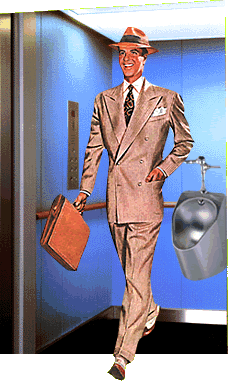
No one is sure why people are urinating with such frequency in the elevators at the Metromover and Metrorail stations in Miami. Should the city distribute pamphlets educating citizens on the symptoms of bladder problems? Perhaps the best solution is for the Miami-Dade Transit Agency to follow the example of other cities and seek high-tech solutions to the recurring urine phenomenon. Or, maybe, just maybe, installing bathrooms is the answer...
These are the questions the Transit Authority is grappling with, following yet another shutdown of the elevators that run from the street to the subway. Work crews have replaced floors and walls 18 times due to the yellow vandalism, and the taxpayers' tab has exceeded $250,000.
According to spokesman Manny Palmeiro, the Miami-Dade Transit Agency has taken steps to cut down on the costs of repairing urine-logged floorboards and eliminating the pungent odors, but the problem still persists. "This is a public facility," he said. "It's abused frequently...It all adds up."
Cleaning crews are making the rounds three times a day, but they can't keep up with the commuters' excessive urination. Part of the problem is that in Metromover stations -- where the free-flowing urine problem is the worst -- there are no bathrooms. Palmeiro says the city can't afford to install them.
Another problem is that both the Metromover and Metrorail stations are often nearly vacant, so people feel free to use empty elevator cabs as their personal latrine without fear of getting caught.
This problem is not unique to Miami. In cities around the world, transit officials have been forced to resort to desperate strategies to stop the widespread wetting.
The Metropolitan Atlanta Rapid Transit Authority replaced the wooden floors in their transit elevators with stainless steel before the 1996 Olympics. They've held up pretty well, according to transit officials there.
In Washington, D.C., transit crews have installed video cameras to catch elevator urinaters in the act. If the city were to charge the public to view the Transit Pee Cams on the Internet, this solution could pay for itself.
In Singapore -- home of the successful month-long Clean Public Toilets campaign -- transit officials have installed detectors that automatically shut elevator doors when a puddle forms on the floor. The culprits are then trapped until authorities arrive. Since this is Singapore we're talking about, one imagines a public flogging of the urinater's private parts, an effective deterrent.
But Miami-Dade officials argue that such high-tech solutions are just too expensive. They've already spent approximately $150,000 to install new, durable surfaces in corroded elevator cabs in each of the Metromover stations and in some of the Metrorail stations. They are planning to fork out another $104,000 to complete nine more upgrades, Palmeiro said.
Not surprisingly, the biggest improvements are the ones that cost the most, like renovations at the Arena/State Plaza Station, which cost nearly $42,000. At the Third Street Station, the price tag for replacing the rotting elevator floors and corroded cab walls tallied around $60,000.
When all of the repair work is concluded (estimates put that at a year) each Metromover elevator will have a new floor that dips in the center to form a one-inch-deep pan. By having the urine flow to the center of the elevator, it will make the cabs easier to clean and will allow elevator passengers room to straddle the puddles. Passengers will be able to ride the elevator without worrying about anything other than controlling their gag reflex.
Jeff Morris is a professional journalist who subscribes to the highest ethical standards of reporting, and other magazines too.
